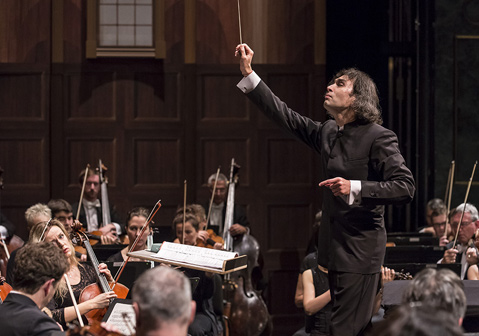Review: The London Philharmonic at Granada Theatre
Vladimir Jurowski Conducted on Thursday, October 9

Thursday’s performance was only the third appearance of the London Philharmonic Orchestra (LPO) in CAMA’s illustrious (and long) career of contracting gigs with international symphonies, and the renowned ensemble, esteemed not only for its stage artistry but for its commercially savvy film soundtracks, did not disappoint. If you are one who believes that no one knows Russian music like a native son, then this Russian-dominated program was truly an authoritative exhibition. Russian conductor Vladimir Jurowski and the LPO brought to life two grand works: Sergei Prokofiev’s Piano Concerto No.3 in C Major and Pyotr Tchaikovsky’s Symphony No. 6 in B minor. The sound was big, the effect was frequently overwhelming, and the musical language rang of authenticity. The concert also happened to be the opening kickoff of the LPO’s U.S. tour. It was a great beginning.
The appetizer for the evening was Antonín Dvořák’s “The Noonday Witch,” one of a trio of tone poems composed in 1896 based on Czech folktales. This dramatic piece of program music quite literally illustrates the tragic story line of an overwrought mother who ignorantly summons a witch when exasperated at her cranky infant, only to ultimately lose the child. A breezy and folksy opening melody quickly gives way to uncertainty and gravity, followed by an adept succession of moods and breathless scuttles. The performance convinced us of Dvořák’s mastery at capturing atmosphere and emotion with the skill of a film composer 40 years ahead of his time.
Grammy Award–winning French pianist Jean-Efflam Bavouzet, featured soloist for the Prokofiev, gave a powerfully assured performance of this demanding keyboard part, sensitively dialoguing with the orchestra and deftly inhabiting Prokofiev’s fiendish surprises and cutting wit. After a stormy ending to the first movement, the Andantino begins placidly with the promise of reprieve but minutes later explodes with the soloist racing up and down the keyboard, whipping the symphony into a fever and settling into hand-crossing gyrations. Bavouzet was wonderful, and I’m certain a few patrons previously lukewarm about Prokofiev were converted.
No. 6 is Tchaikovsky’s last symphony, “Pathétique,” is a work so important to Jurowski that the maestro chose to address the audience beforehand, explaining that the piece “expresses matters of life and death,” which deserves the respect of silence and space. His main concern was the huge ending of the third movement — which can easily be mistaken for the end of the symphony — yet the energy suddenly deflates into a grief-wrung prelude to the fourth movement. Jurowski wished to usher that transition without pause for maximum effect. Alas, despite the warning, shouts and applause erupted, and the moment was spoiled. Whether the fault was a lapse of concentration or failure to heed what could not be heard (Jurowski did not use a mic) or some combination of the two, no one will ever know. But for the future, my suggestion to CAMA — use the mic.



